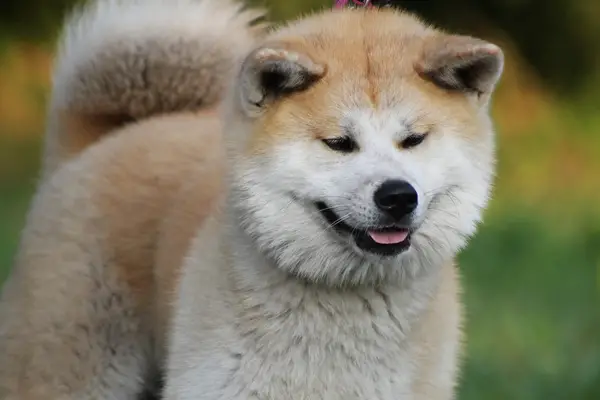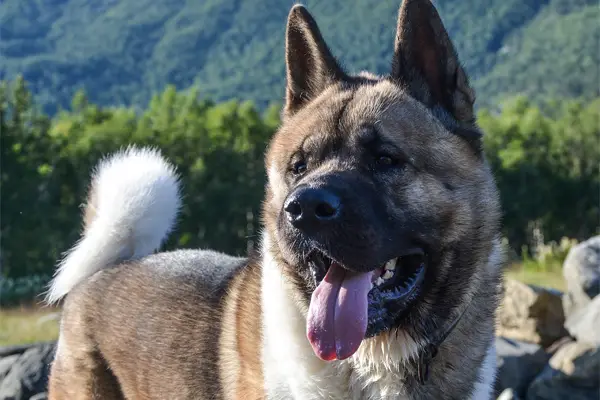The Akita is a large breed dog known for its powerful appearance. They have sturdy, heavy-boned bodies covered with a dense coat that comes in various colors. Their head is broad and massive with erect ears and dark eyes, creating a very alert expression.
The breed is most known for their unwavering loyalty to their owners. They have served as protectors and guardians of the family for centuries in Japan, and they continue to do so until now.
Although an excellent dog breed, the Akita is not for everyone. First-time owners may have a hard time handling this dog. These are not lap dogs, and the owner needs to put in a considerable amount of time, effort, and training.

Akita Statistics
| Dog Breed Group | Working |
| Breed Size | Large to Giant |
| Height | 26-28 inches (male); 24-26 inches (female) |
| Weight | 100-130 pounds (male); 70-100 pounds (female) |
| Lifespan | 10-13 years |
Akita Ratings
| Energy level | |
| Exercise needs | |
| Requires attention | |
| Playfulness | |
| Trainability | |
| Shedding | |
| Grooming | |
| Friendly with family | |
| Friendly with kids | |
| Friendly with strangers | |
| Friendly with other dogs | |
| Prey Drive |
Akita History
Akita dogs are one of the ancient dog breeds in Japan. They are believed to have originated from the province of Akita, where they were named after.
For centuries, Akita dogs have always occupied a special place in Japanese culture. They symbolize happiness and longevity, where when a child is born, parents usually receive an Akita statue.
The earliest record of the breed goes back to the 1600s. During these times, they were used as guard dogs for Japanese royalties. They also hunt and herd, depending on what the Japanese people ask of him.
Japanese people give credit to Helen Keller that the breed was introduced to America.
As the story goes, Japanese people held Helen Keller in high regard. They took her to Shibuya to view the statue of Hachiko, the famous Akita known for his loyalty in the 1920s. When Helen Keller said she wanted one of her own, the people of Japan did not hesitate to give her one. She brought the Akita puppy to America, but it also died of distemper at a young age. When the Japanese heard this news, they sent the puppy’s older brother.
After World War II, American men stationed in Japan brought back more Akitas to the US grounds. By 1956, a man named Thomas Boyd was the first to produce the first Akita puppies in the US.
By 1972, the breed was officially registered by the American Kennel Club. And until now, they are known to be fearless, confident, and devoted to their human family.

Akita Temperament
The American Kennel Club describes the Akitas as courageous, dignified, and profoundly loyal. They are affectionate and playful when it comes to their family, and they thrive for human companionship.
They love having daily activities at home, especially if both of you are bonding. They also like to express themselves through grumbling or moaning, but rarely bark.
With strangers, however, you can expect them to be alert and reserved. You also need to expect their protectiveness to show through, and they will stand guard in case you would need him.
Another thing that you should note is that Akitas are best for one-dog households. They don’t like being around other dogs and can be aggressive, especially with males. He also won’t do well with other small animals such as cats and birds.
Early socialization and training are needed to control this dog’s temperaments. This would also help him get used to new people, animals, sights, and sounds, so he’d be able to differentiate between friend or an enemy.
Of course, you would need to be firm and consistent to let him know you’re in charge. It will take a lot of patience from you as this dog breed can be very stubborn. They are strong-willed, assertive, and intelligent that he will try to get his way.
The Akita is a bold dog with varying temperaments. However, with the right person, they can be delightful pets. They are adorable, clean, calm, and quiet, especially when raised well.
Akita Care Requirements
- Nutrition: Akita is a large-sized dog breed with high energy, which means they also need to consume high amounts of food. However, it should not just be any food, but must be of high-quality. Essential nutrients that should be found on your Akita’s meal are fats and protein. Both are essential to provide your dog with energy for his daily activities. Meat should always be the best source of protein and can be derived from beef or lamb. You can also add fruits and vegetables as sources of fiber. Always watch your dog’s calorie intake. Overfeeding a dog is never a good idea, so you should be careful. For a puppy Akita, about 150-250 grams of food a day should be enough, while an adult would need around 500-800 grams a day. Of course, you should consider other factors as well, such as health disease and activity level. If you’re going for dog food, check the ingredients. It should not contain artificial flavors, by-products, fillers, and anything else with very little nutritional value. This is also not healthy for your dog’s digestion.
- Grooming: Akita has a double coat that sheds seasonally. You need to brush their coat at least once a week, so it remains healthy. If shedding season comes, then you might need to do this daily. Akitas don’t need a lot of baths. They are very clean dogs and have a very minimal doggy odor. So, no extensive grooming is necessary. However, ears should be checked and cleaned regularly to avoid ear infection. Don’t forget the Akitas nails too. Make sure that it remains shorts, as long nails can be painful for them.
- Exercise: Akitas are not super highly energetic dogs, however, moderate but regular exercises will keep them happy and healthy. At least two hours of daily activities should suffice. This could be in the form of a daily jog or brisk walk. Other than that, you can create some activities that you can do together. This can either be outside or inside your house, but it needs to be secure. Swimming would be an excellent exercise for them too as they love water.
- Health: If you’re an Akita owner, one disease you might encounter is hip dysplasia, which can cause problems in your dog’s walking. Another is progressive retinal atrophy, which is an eye disease that can cause blindness. Von Willebrand’s disease or a bleeding disorder is also common. Besides these three, you also need to watch out for immune system disorders that may cause skin diseases. Some of these diseases can be detected early through some screening tests. So, it’s advisable if you have your puppy take one to rule out any possibility. For other diseases, however, you would need to rely on your observations to detect if something is wrong. If a particular disease is genetically transferred, you can check with the dog’s parents to rule out any possibility.
- Lifespan: The life expectancy of Akitas is 10-13 years.

Famous Akitas
- Hachiko: The loyal Akita who waited for his dead owner every day in the station; Hachiko died waiting; Japanese people even built a statue to commemorate this dog’s loyalty
- Kamikaze: the first Akita to go overseas; a gift to Helen Keller
- Yume: The Akita dog of Russian President Vladimir Putin
Fun Facts About Akitas
- They were originally called Odate dogs, named after a region in Japan; their name officially changed in the 1930s.
- Akitas are made for snow; they can thrive in cold and rocky environments.
- They symbolize good health, happiness, and longevity. Sometimes, Japanese people will give someone a small Akita statue to wish them good health.
- They were a status symbol in the 17th century where the breed was restricted to Japanese aristocrats.
- An Akita Dog Museum exists in Odate Japan in celebration of Hachiko and all the Akita dogs.
- They were almost wiped out during World War II.
- They have cat-like personalities.
